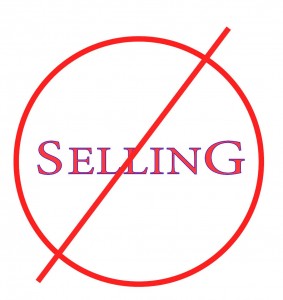
 Last week I had a couple of people mention problems they’d had at networking events, and they were all around this issue.
Last week I had a couple of people mention problems they’d had at networking events, and they were all around this issue.
Networking is not selling. Yes, you can make sales from networking, but that isn’t your focus at an event. You’re there to make contacts which can turn into future referrals or sales. But you’re not there to sell.
How did this come up? One of my networking contacts was talking about an event she no longer attends. Why? Because most of the people at the event were small business owners (mostly selling jewelry, handbags and clothing), and she said all they wanted from the event was to sell her their wares. She wasn’t there to buy stuff. She was there to network, make connections and to find and give referrals to others.
The other person called to tell me about a one to one meeting he’d had. When he set up the meeting, he thought he’d been clear that he wanted to learn about her business so he could refer her. When he got to the one to one meeting, it quickly became obvious that she thought he’d wanted to become her client. He was unable to redirect the meeting, and he left with the strong impression that she didn’t want to talk to him unless he wanted to work with her.
These are two reasons many people don’t want to network, which is a shame. Networking is a great activity that I think everyone should engage in, so I’m particularly disappointed when I hear stories like these.
What’s to be done about it? If you encounter it while networking, just move on. You’re unlikely to convince them they’re doing something wrong, so I don’t suggest even trying.
If you catch yourself going into sales mode while networking, take a step back. Let people come to you to express interest in your products or services. If we want to explore buying from you, we will, but let us do it when we are ready. Remember the “Who do you know who?” philosophy. Who do you know who needs your products or services? If it’s me, I’ll say so. If I know someone I can refer you to, I’ll say so. But if I think my contacts are going to get a hard-sell, I won’t refer you.
What about one to one meetings that you think might be a sales call? Don’t think of them that way. Ask questions first. Discover needs. If you find that the person needs you, direct the conversation in that direction. To keep myself on track, when I schedule something that I think might be a meeting with a potential client, I note it in my calendar as a “Consultation.” That’s my reminder to ask questions and provide value from the meeting. Most of those meetings naturally turn into clients, but even if they don’t, I make certain to provide value so when they go talk about me, they say “Meet with Juli. She’s great.” Much better than “Stay away. She’s only going to try to sell you something.”